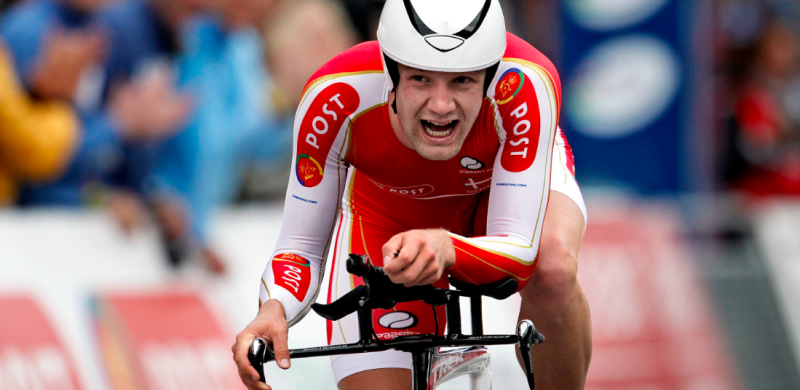An absolutely incredible new film review just came out for our fascinating release MOON RIDER (directed by Daniel Dencik). It’s written by one of Canada’s top film journalists, Pat Mullen.
Some of Mullen’s great takeaway lines include:
Moon Rider is an underdog sports story, the kind that’s been told countless times, but nobody has ever quite told it like this. This outstanding and visually striking film has an energy that’s hard to define.
Moon Rider looks at cycling prodigy Rasmus Quaade as he trains for the World Championship knowing the limitations of his body could kill, not only his dream, but himself as well. Like Mickey Rourke in The Wrestler, though, Rasmus isn’t daunted by a pure love of the sport that defines him. It’s better to go out doing what he loves than to live forever knowing that he didn’t try.
Moon Rider is a film that replicates the mindset of its subject. It situates the viewer behind the handlebars, letting one feel the rush and energy that fuels Rasmus lap upon lap. The result is a film that straddles the world of documentary, drama, and experimental cinema alike. Stylistically visionary and dramatically compelling, Moon Rider is a winner.’
We couldn’t agree with Mr. Mullen more and we know that after watching Moon Rider you will agree that there has never been a cycling film that has been able to immerse the viewer in the mind of a great cyclist to the extent that Moon Rider does. It’s an incredible journey!
You can watch the trailer for and purchase the download of Moon Rider here:
Or you can purchase Moon Rider it as part of a 3 Pack with two other magnificent cycling films, The Last Kilometer and 7 Deserts, here:
MOON RIDER REVIEW
Pat Mullen, of CinemaBlographer:
Moonrider is an underdog sports story, the kind that’s been told countless times, but nobody has ever quite told it like this. This outstanding and visually striking film has an energy that’s hard to define. Director Daniel Dencik follows up-and-coming cyclist Rasmus Quaade as he strives to become World Champion and the film chronicles the athlete’s relentless strive to become a professional doing his one true passion. Rasmus, however, almost has too much drive to become the best. It’s this objective gaze, which sees Rasmus both as a source of inspiration and as a rabbit hole into the mania of professional sports, that sets Moonrider apart from other sports films as it follows its subject to the finish line.
It seems as if Rasmus will have an easy ride to the podium when Moonrider begins, for the cyclist recounts in voiceover his experience of biking so fast through the streets of his town that he would set off sensors meant to detect speeding cars. 60 Km/h is the pace at which Rasmus torpedoes through the streets during his rigorous training regime to realize his dream. Keeping up a pace like that, the title of World Champion shouldn’t be too far away.
There’s an abrupt shift in the footage, though, as Rasmus becomes light-headed and dizzy and collapses during training. He pushed himself too hard. He strove to fulfill his dream beyond his body’s capacity to achieve it.
Moonrider then looks at Rasmus anew as he continues to train for the World Championship knowing the limitations of his body could kill not only his dream, but himself as well. Like Mickey Rourke in The Wrestler, though, Rasmus isn’t daunted by a pure love of the sport that defines him. It’s better to go out doing what he loves than to live forever knowing that he didn’t try.
It’s fascinating to watch Rasmus from a distance as he negotiates being the key liability to his goal. Dencik never comments on the footage captured through the Super 8 and instead lets Rasmus’s ambition speak for itself. The cyclist appears in voiceover throughout the film, although Moonrider never explicitly features a direct address or interview with Rasmus. The result, oddly, is a film that replicates the mindset of its subject. As Moonrider straps a camera to its helmet and follows the rider throughout the outdoor competitions and indoor tracks, it situates the viewer behind the handlebars, letting one feel the rush and energy that fuels Rasmus lap upon lap. (The cinematography by Dencik and Aske Alexander Foss is worth the price of admission alone.)
The viewpoint also makes clear how exhausting the trials and preparations can be. At times dizzying and disorienting, Moonrider makes plain how unhealthy Rasmus’s regime actually is. It’s something that the cyclist himself acknowledges, saying, “You lead such a healthy life it can be unhealthy.” With his body as the one thing holding him back, but training and discipline offering the only way to advance, Moonrider suggests that Rasmus’s relentless and potentially self-destructive quest to be number one is an addiction. To pursue life with a death wish is an odd but exhilarating feeling, and since Dencik lets the viewer experience the race from a cyclist’s point-of-view, one can feel the rush of adrenaline and the thrill of feeling alive that fuels Rasmus’s mania.
Rasmus explains how the rush of propelling the bike and the quest to overcome his limitations is neither a bodily nor an earthly experience, but rather a spiritual one. He talks about using his bike to shoot the moon as his passion for cycling lifts him and as his discipline sets objectives that seem almost too far to overcome. The image of the moon is interspersed throughout the film as a metaphor for the cyclist’s reach and, as the film’s synth score propels the film with a retro flair, Moonrider shows the determined rider as both a visionary and an isolated figure. The approach has one both rooting for Rasmus and wishing that he would stop.
It’s a sympathetic and engaging character study regardless of whether one sees Rasmus as crazy or as commendably committed. Moonrider allows the audience to both get inside the subject’s head and observe him from a distance thanks to Dencik’s unique approach. The result is a film that straddles the world of documentary, drama, and experimental cinema alike. Stylistically visionary and dramatically compelling, Moonrider is a winner.






